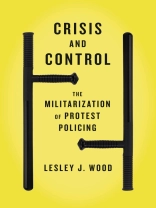Crisis and Control explains how neoliberal transformations of political and economic systems are militarising the policing of protest, based on a compelling empirical study of police agencies and practices from 1995 until the present.
Lesley J. Wood shows that the increasing role of the security and defense industries, professional police associations, anti-terrorism initiatives and ‘best practices’ in policing networks have accelerated the use of less lethal weapons, pre-emptive arrests, infiltration and barricading strategies against protesters.
The book uses Bourdieu and Boltanski to analyse court transcripts, police reports, policy, training materials and the conference programs of professional police organisations to argue that police agencies are neither omnipotent strategists, nor simple tools of the elite, but institutions struggling to maintain legitimacy, resources and autonomy in a changing field.
विषयसूची
Acknowledgements
List of Acronyms
1. Introduction
2. Policing Waves of Protest 1995–2013
3. To Serve and Protect Who? Policing Trends and Best Practices
4. Local Legitimacy and Struggles for Control
5. Officers Under Attack: The Thin Blue Line, Pepper Spray and Police Identity
6. Experts, Agencies, the Private Security Sector and Integration
7. Protest as Threat
8. Urine-Filled Supersoakers
9. Crisis and Control
Notes
References
Index
लेखक के बारे में
Lesley Wood is Associate Professor of Sociology at York University in Toronto, Canada. She is the author of Crisis and Control (Pluto, 2014), Direct Action, Deliberation and Diffusion (2012) and co-author of the third edition of Social Movements 1768-2012 (Pluto, 2012). She is an activist in the global justice and anti-poverty movements.












